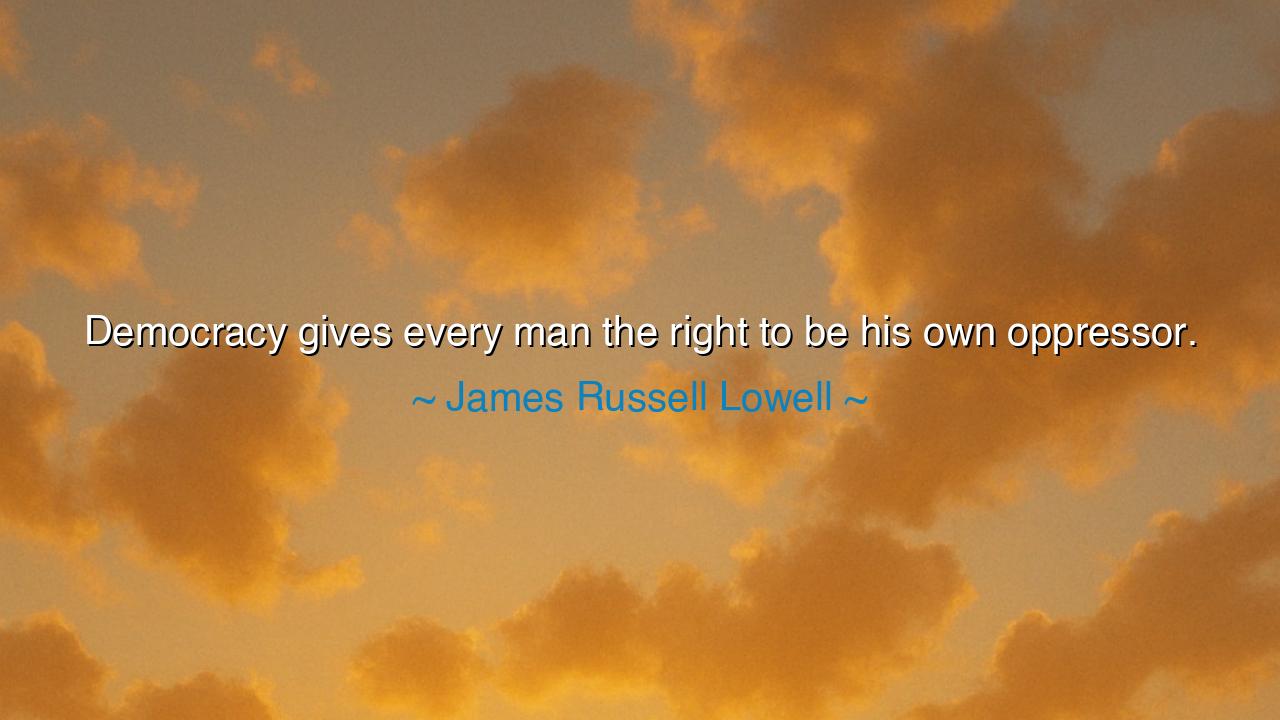
Democracy gives every man the right to be his own oppressor.






When James Russell Lowell wrote, “Democracy gives every man the right to be his own oppressor,” he was not mocking freedom — he was revealing one of its most painful and profound truths. In these few words, Lowell, a poet and philosopher of America’s 19th century, exposed the paradox at the heart of self-government: that liberty, if not guided by wisdom, can turn upon itself. His warning was not against democracy, but against the ignorance and apathy that can make a free people the architects of their own chains. Beneath his irony lies a solemn truth — that the power to choose, unguided by virtue, may lead a man to enslave himself.
The origin of this quote lies in Lowell’s deep concern for the moral health of democracy in a rapidly changing America. He lived in an age when the promise of freedom was expanding, but so too were the dangers of corruption and populist manipulation. As a fierce abolitionist and advocate of conscience, Lowell believed that democracy required not only liberty, but character. He saw how the same vote that could build a just society could also empower demagogues — how the same people who once fought for independence could, through neglect or selfishness, surrender their future to tyranny. Thus, his words were a lament as much as a revelation: that democracy’s greatest enemy is not the tyrant, but the citizen who ceases to think, to care, and to act.
To say that democracy “gives every man the right to be his own oppressor” is to remind us that freedom demands responsibility. In a monarchy, a tyrant rules by force; in a democracy, the people rule themselves — and therefore, the burden of tyranny falls inward. When citizens abandon reason for comfort, passion for thought, or morality for convenience, they forge the very chains that bind them. The laws they accept, the leaders they elect, the truths they ignore — all these become instruments of self-oppression. In this way, Lowell foresaw the danger that every republic must face: that the people, desiring ease, may trade away their freedom without a sword ever being drawn.
History bears witness to this tragedy. Consider the fate of the Athenian democracy — the cradle of freedom itself. The people of Athens once stood as a beacon of civic virtue, but in time, they grew restless and indulgent. They listened not to the wise, but to the flattering. They cast aside discipline for pleasure, and judgment for applause. In their passion, they banished philosophers, executed Socrates — the very voice of reason — and surrendered their power to demagogues who promised glory but delivered ruin. Thus, Athens fell not by conquest, but by self-oppression, proving Lowell’s prophecy centuries before it was spoken: that democracy carries within it the seed of its own destruction when citizens forget the sacred duties of freedom.
Lowell’s insight also speaks beyond nations — it speaks to the individual soul. Every man, in the republic of his own conscience, has the power to be both ruler and oppressor. When he allows fear, sloth, or greed to rule him, he becomes the tyrant of his own potential. When he refuses discipline, he enslaves himself to desire. When he silences truth for comfort, he trades the sovereignty of his spirit for the ease of bondage. Thus, democracy’s lesson is not only political but deeply personal: the freedom to choose means the burden to choose rightly. To govern a nation well, one must first learn to govern oneself.
And yet, Lowell’s message is not one of despair. His warning is the call of a sentinel — urging citizens to awaken, to act, to think with courage. For if democracy gives every man the right to be his own oppressor, it also gives him the power to be his own liberator. The same ballot that can enthrone a tyrant can also restore justice. The same voice that can spread lies can also proclaim truth. In this lies the enduring hope of self-government: that within every heart resides both the danger and the defense, both the poison and the cure.
The lesson, then, is timeless: freedom without virtue is a mirage, and democracy without wisdom is a snare. Each generation must renew the sacred contract between liberty and responsibility. Let no man imagine that freedom is kept by laws alone — it lives by conscience, by vigilance, by the courage to question, and by the humility to learn. Do not become your own oppressor through apathy or indulgence. Govern your thoughts, your choices, and your nation as a steward, not as a slave.
So let this truth be passed to all who cherish liberty: democracy is not merely the right to rule, but the duty to rule oneself. Guard your freedom not with anger, but with integrity. Seek truth even when it wounds, and hold power lightly, as a sacred trust. For the moment a free people forget their own responsibility, the chains of their oppression will be forged — not by tyrants from without, but by their own unthinking hands.






AAdministratorAdministrator
Welcome, honored guests. Please leave a comment, we will respond soon